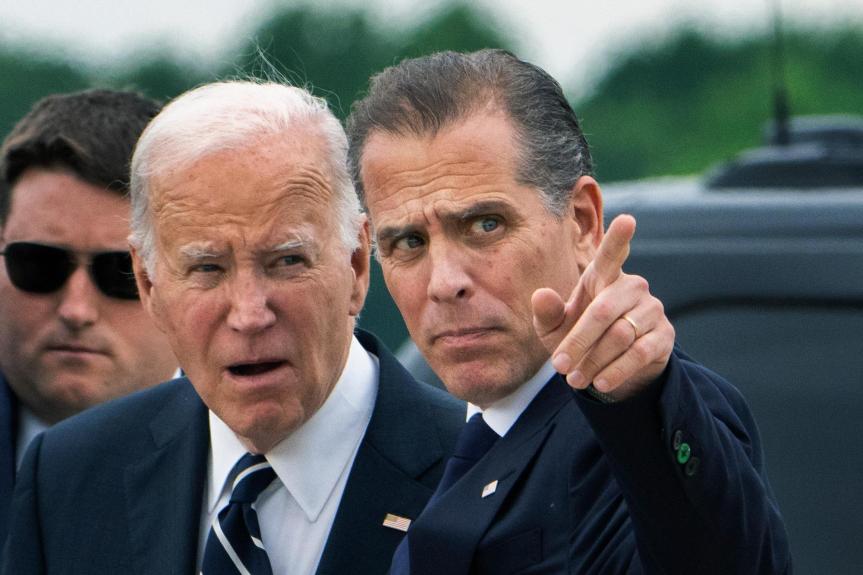Pardoning Hunter – The Right or Wrong Leadership Decision

President Biden pardoned his son, Hunter Biden, voiding his Federal criminal convictions. Pres. Biden said he issued the pardon because his son’s prosecution was politically motivated.
This pardon challenges us to understand our obligations as the leader of a company, non-profit, sports team, or our country. If I am an employee, I want and expect the company’s leadership, including the CEO, division, and department heads, to act in the best interest of the company and not simply act for their own personal interests.
If I am an investor in a company, I expect the board of directors and the senior leadership to act in the best interest of the company as a whole and not simply for their personal benefit. As a citizen, I have the same expectation of the mayor, the governor, and the President.
Many commentators with a national audience said that Pres. Biden should have described the pardon as a caring gesture that any father would do to spare his son from the risk of serving time in jail. According to this reasoning, if Pres. Biden used his Presidential powers to protect his son from the consequences of his crimes, the pardon would be OK because the President was simply taking care of his family. That reasoning violates the first principle of leadership and is a dangerous precedent to set.
In my book, Create the Future, I discuss the important separation between your responsibilities for the organization you lead and your responsibilities for yourself and your family. Both are important, and they are different. I use the phrase, “You are not the company.” Leaders get in trouble when they confuse their plans for the organization they lead with their desires for themselves and their families.
When I accept the position of Executive Director, CEO, or Department Head, I am agreeing to be responsible for the wellbeing and success of the organization. I am committing to act in the best interest of the organization with each decision I make. If I cannot make that commitment, I should not take the job. We are frequently in positions where what is best for the company conflicts with what is best for us personally or for our family. I am thinking of a job’s required time commitment, a necessary relocation, or a position that is not the best use of my skills.
In Create the Future, I tell the story of a friend who was CEO of a successful company selling primarily to the military. The company’s board wanted to use the company’s technology to develop video game products for the consumer market. The CEO doubted these products would be competitive, and he did not want to make a multi-year commitment to lead that effort. The company’s interests, as decided by the board, conflicted with his personal interests. The CEO told the board that the best next step was to bring on a new leader whose personal interests would not conflict with where the board wanted to take the company. My colleague worked with the board to make that happen.
In the last week, the FBI arrested a Boston City Councilor. She had hired a relative to work on her City Council staff. The Councilor gave the relative a “bonus” under the condition that the relative gave much of the bonus back to the Councilor in cash. The City Councilor had the authority to give bonuses to her staff.
Some will say there is nothing wrong, criminally, having a private agreement with the staff member/relative to give part of the bonus back to the Councilor. Two years earlier, this Councilor hired her sister and son onto the Council staff. The State Ethics Commission required her to terminate their employment. This Councilor did not separate her responsibilities as a leader from what she wanted for herself personally and for her family.
Pres. Biden pledged multiple times not to pardon his son. This pledge was a statement that he would not allow his personal interests to override his obligations as President. After the presidential election, Pres. Biden pardoned Hunter Biden’s convictions for crimes for which he had pleaded guilty in court. Guilt or innocence was not an issue. The issue was whether the judicial system would continue with Hunter’s sentencing, or the President would stop the proceeding to benefit his family.
I think of the City Councilor in Boston asking a relative on her payroll to kick back a bonus payment and the President of the United States stopping his sons’ sentencing. Some say that politicians and company leaders always help themselves and their families. While there is some truth in that view, I hope each of us has and communicates a clear expectation that our leaders will act in the interests of our country, our company, and every organization they lead and not use their power and position for their personal benefit and the interests of their family.
Catskill Red Barn in the Fall
The leaves have fallen. Vibrant fall colors are gone. We now see the gray, stark profiles of the trees without their summer hats and ancient stone walls. We see the red barn we might not have noticed amid the summer green and blossoms.
